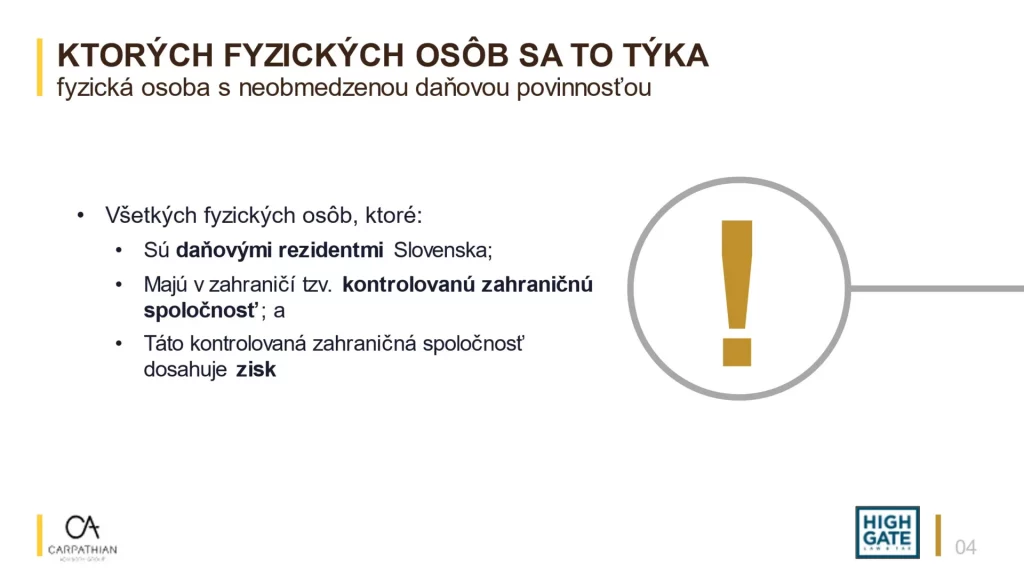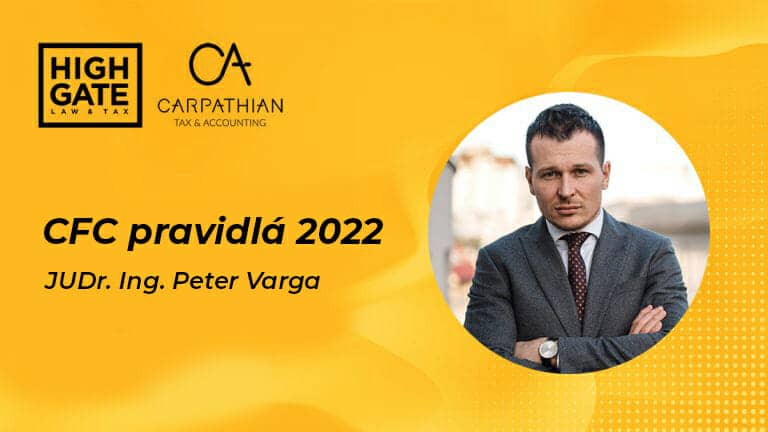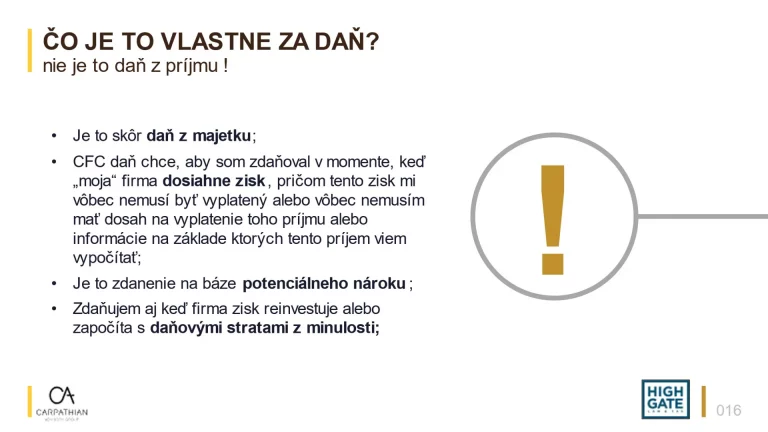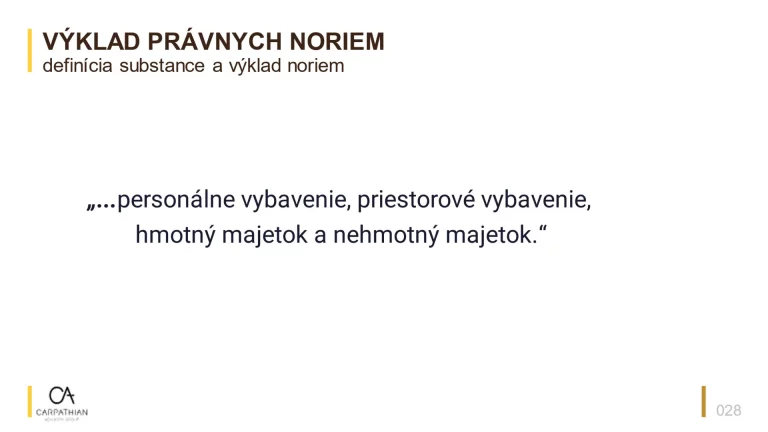
In 2020, the Income Tax Act was amended to include provisions introducing rules for the inclusion of income from controlled foreign companies to individuals (so-called. CFC rules).
Účinnosť týchto pravidiel bola posunutá z 1.1.2021 na 1.1.2022.
Podstatou týchto pravidiel je taxation of Slovak tax residents, natural persons, from the profits made by their foreign shell companies and companies based in the so-called.
non-cooperative states.
We can thus say that the CFC rules pursue a legitimate objective and that is to limit artificial foreign structures, the purpose of which is to evade the payment of taxes in Slovakia. However, as we will show below, it is questionable whether the CFC rules really pursue only this objective and whether it would not be appropriate to modify them to pursue this objective more specifically.

One of the stated reasons why the CFC rules were postponed to 2022 was that they were not ready to be put into practice.
Part of this problem was, and to a large extent still is, a number of terminological ambiguities and illogicalities embedded in the rules.
Moreover, the concept of the CFC rules contradicts the basic philosophical principles of taxation and constitutional principles.
Thus, in this article, I will try to name several problems we have encountered in the application of these rules in practice.
For the purpose of grasping the various points of concern, let us imagine a situation where:
(“Example“)
If you want to know more about the CFC rules, watch a training session with Peter Varga or arrange a consultation with him

Do the CFC rules apply to this Example?
Yeah.
FO must pay 25% “CFC tax” in 2023 tax return for 2022.
The FO will thus pay EUR 31 250 to the State.
If the FO subsequently pays a dividend from HoldCo to Slovakia, it will also pay 15% dividend tax in the Czech Republic in the amount of EUR 18,750. The total tax liability of the FO is thus EUR 50 000. If they set up the joint venture with a Czech partner in Slovakia, the FO’s total tax liability would be EUR 8 750.
The CFC rules do not aspire to tax income, but rather function as a quasi-tax on wealth.
The FO has not earned any income in the “Example”, but nevertheless taxes a sort of deemed income in the form of its HoldCo’s profits.
The concept of the CFC rules as thus set up is contrary to the basic principles of taxation and it would be appropriate for it to be subjected to a constitutional legal excursus.
In connection with the taxation of some presumed income of the FO, the question arises what if the FO does not have the funds in the account to pay such tax liability? Indeed, the CFC rules tax the FO in situations where the FO does not have such income and it is not even certain whether it will ever receive it (i.e. the absence of the so-called ability to pay).
In principle, it has three options:
An obvious problem with the above example is that the CFC rules also penalise controlled foreign companies (such as HoldCo) which, if they were tax resident in Slovakia, would not tax the gain anyway.


Let us imagine a situation where a taxpayer, an individual with unlimited tax liability in Slovakia, has a company controlled abroad by a company from a non-cooperative country and the company achieves the following results:
| Accounting period | Economic result | CFC tax |
| 2022 | – EUR 150 000 | 0 EUR |
| 2023 | + 120 000 EUR | EUR 42 000 |
The 25% tax rate is also disproportionately high in light of the above Example. The stated intention of the CFC rules was to force individuals, Slovak tax residents, to pay themselves dividends from their foreign companies.
35% tax rate for the so-called.
non-cooperative states can be understood.
However, the set of so-called.
The set of non-cooperative states is broad and so even a standard and traditional company located in such a country would be liable to pay a 35% “CFC tax” for FOs .
Moreover, such a universal application of the 35% tax rate appears to be contrary to the free movement of capital as defined by the case law of the CJEU.
For companies from the so-called.
cooperating countries (e.g. HoldCo) can be exempted from the CFC rules if the company in question has personnel, premises, tangible assets and intangible assets.
Thus, the company must have so-called substance.
I specifically address the topic of “substance” in my training on the tax exemption for the sale of shares in Slovakia. A certain discourse has emerged in the professional community on this topic, which helps to create substance for this institute. In the case of the CFC rules, I have not yet seen such a discussion, and so more exposure to arbitrariness on this topic by the tax administrator.

In our fund practice, we have established a number of smaller investment funds within the Highgate Group, where often some investors will take a stake in the fund in excess of 10%.
Fund investing is passive investing and it does not entirely make sense for it to be subject to CFC rules which are designed to penalise active taxpayers moving profits offshore (or not remitting profits to Slovakia as the Explanatory Memorandum says).
Under the CFC rules, up to a 50% threshold applies to foreign companies . Therefore, this 10% threshold seems to me to be unreasonably low, which may also mean that in practice the taxpayer may not even be aware that the CFC rules apply to him.
This is also what the OECD report recommends.
And even if the threshold should fall below 50%, it should only be for aggregated dependants’ shares.
In tax-transparent companies, the profits of such companies are not taxed at their level, but this profit or tax base is shifted to the individual shareholders, who tax it. Is a tax transparent company capable of triggering an individual’s liability to CFC tax?
Unfortunately, the law does not give us a clear answer to this.
For the CFC rules, the Act refers to the term “taxpayer“, which has a clear definition in the Act.
Thus, can entities, pools of assets or various forms of legally transparent companies not be considered as a taxpayer for the purposes of the CFC Rules?
One of the prerequisites for the application of the CFC rules is that the foreign company in question taxes at an effective rate lower than 10%.
However, by comparing the profit or loss(it is not clear whether net or gross) with the tax paid, this condition does not take into account, for example, the various tax-advantaged schemes (in our case, for example, the Patent Box or the Super Deduction) or the application of accumulated tax losses.
In such a case, even the country with the highest corporate tax rate may simply fall into the “tax haven” regime.
Given the limitations of this paper, it is not possible to grasp the entire issue of CFC rules in this one place. If you would like more information, please see training with Peter Varga or you can book a consultation with him.
1. OECD (2015), Designing Effective Controlled Foreign Company Rules, Action 3 – 2015 Final Report, OECD/G20 Base Erosion and Profit Shifting Project, OECD Publishing, Paris. http://dx.doi.org/10.1787/9789264241152-en , dostupné k 12.11.2021 na https://www.oecd.org/publications/designing-effective-controlled-foreign-company-rules-action-3-2015-final-report-9789264241152-en.htm

If you are interested in this topic, please do not hesitate to contact us.
Law & Tax
Tomas Demo
tomas.demo@hg.amcef.com
Accounting
Peter Šopinec
peter.sopinec@hg.amcef.com
Crypto
Peter Varga
peter.varga@hg.amcef.com
Highgate Law & Tax
Nivy Tower, Mlynské Nivy 5,
821 09 Bratislava
Slovak Republic
Highgate Accounting
Nivy Tower, Mlynské Nivy 5,
821 09 Bratislava
Slovak Republic
E-mail
info@hg.amcef.com
Are you interested in the services of Highgate
Group? Get in touch at
info@hg.amcef.com
Careers
Interested in working for Highgate
Group? Get in touch at
info@hg.amcef.com